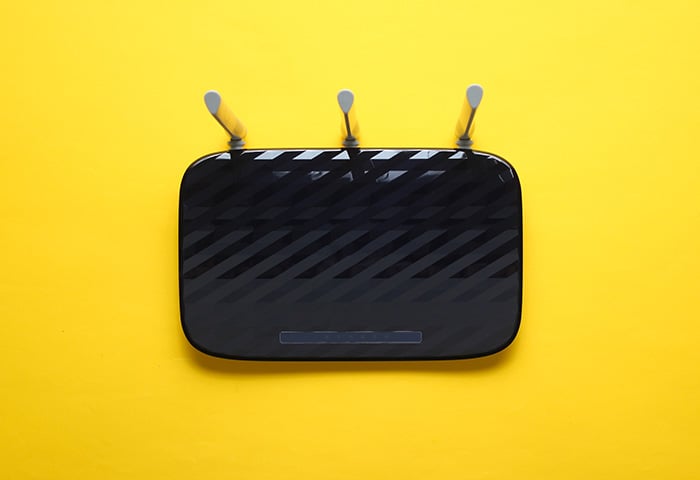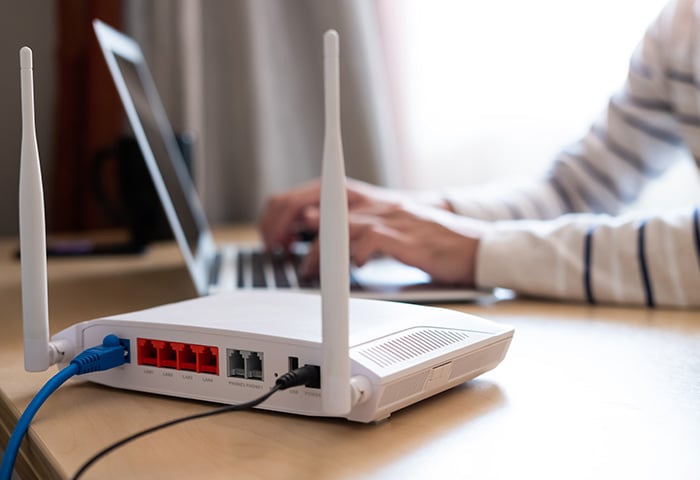What does ping mean?
“Ping” is an online gaming term for latency — the time it takes for data to transfer across a network. Measured in milliseconds (ms), the higher the ping, the longer the delay between player inputs and server responses, and the more lag you’ll experience on your screen.
High ping can occur even with a fast internet connection, resulting in a jagged and frustrating gaming experience. So if you want to optimize your PC for gaming, reducing ping should be one of your top priorities.
Why is my ping so high?
There are a number of reasons why you might be experiencing high ping. Common reasons include:
-
Your router location: The proximity and positioning of your router can affect network latency, and walls or longer distances between the router and device are often responsible for high ping. Simply moving closer to your router can help reduce ping.
-
Poor internet connection: Slow internet speeds mean slower server response times and can cause lag.
-
Distance from the server: Connecting to a server in another country or continent will increase ping by forcing data to traverse long distances. Select a server closer to your geographic location to reduce ping.
-
Too many devices connected: If a large number of devices are all connected to the same router, data congestion will result in slower response times and increased lag.
-
Background processes: Your bandwidth could be eaten up by things like software updates, streaming, apps running in the background, or ongoing file downloads.
-
Over-optimized game settings: It’s natural to want higher-quality animation while gaming, but over-optimizing your in-game graphics settings could be slowing your gameplay.
-
Firewall configuration: Your firewall checks all incoming and outgoing data to keep your device secure. This might be causing an increase in latency.
 Too many devices connected to your router, a poor Wi-Fi connection, and draining background process all contribute to having a high ping.
Too many devices connected to your router, a poor Wi-Fi connection, and draining background process all contribute to having a high ping.
Is a lower ping better?
The lower your ping, the better. A low ping number — usually defined as 50ms or less — will enable a smoother gaming experience with less lag time. Achieving the lowest ping number possible is particularly important for professional gamers, as this gives them an edge over their competition.
How to lower ping
If your ping is higher than 100ms, it’s likely detracting from your online gaming experience and you should look into how to fix high ping. Wondering what is a good ping to aim for? Ideally, you want a ping of 50ms or lower, but a ping below 20ms will offer you the smoothest gameplay with no noticeable lag.
Here’s how to improve ping and achieve good latency for gaming:
1. Check your router setup
To ensure the best connectivity conditions for low ping, check your router setup and boost your home Wi-Fi signal strength. Make sure your router and device are as close to each other as possible; ideally, there shouldn’t be any walls between your router and your device, as this can hamper connectivity and create lag.
As well as checking for viruses on your router to make sure malware isn’t compromising your security or causing a laggy connection, periodically restarting your router can give it a performance boost by clearing cached internet data stored in its memory.
2. Run an internet speed test
Although it’s possible to have both high ping and fast internet, a slow internet connection is often the culprit. To find out if this is the case, run an internet speed test by simply typing “internet speed test” into Google, and clicking Run speed test. Then, click Go to run the speed test.
The results will show your download and upload speeds, your latency (ping), and an overall assessment of your internet speed.

If your internet speed is slow, troubleshooting and fixing your connection will allow for faster data transfers, and likely enable you to decrease your ping.
3. Remove all unused background apps
Running apps in the background doesn’t just gobble up precious CPU and GPU resources needed for smooth and steady gaming performance. It can also make your ping higher than usual.
Whenever you’re gaming and want to decrease your ping, ensure the following:
-
There are no ongoing software updates.
-
There are no large files downloading.
-
You’re closed out of any TV or music streaming services.
-
You’re closed out of any other apps and programs that are not in use.
There might also be programs using up your bandwidth and storage space without your knowledge. That’s just one of the reasons why it’s a good idea to uninstall any unnecessary programs on your device. You can also restrict background data to make sure it’s not throttling your browsing or gameplay.
4. Choose a different server
Many online games allow the player to choose their preferred server. But if you select a server on the other side of the world, that will result in high latency, meaning high ping. When selecting a server, choosing one that is geographically close to you — ideally in the same country or state — will help you achieve good latency for gaming.
5. Use an ethernet cable
Wi-Fi not working as well as it should? It’s a bit old school, but using an ethernet cable will give you a faster and more reliable internet connection. This is because a wireless connection relies on radio waves, and some speed is lost when data is converted every time it’s sent and received. With an ethernet cable, data is transferred in an instant via the wired connection.
6. Disconnect other devices from your network
The more devices connected to your network, the heavier the internet traffic, and the less smooth your data’s journey to and from the gaming server, meaning more latency and higher ping. Disconnecting other devices from your network will improve ping by freeing up bandwidth.
What is considered high ping?
Ping of 100ms or higher is considered too high for online gaming because, at this level of high latency, noticeable lag starts becoming problematic. Although many factors contribute to ping times, most broadband connections offer a ping of less than 100ms, and may even enable optimal ping levels of less than 50ms.
Lower your ping to enhance your gaming experience
Just one weak link in the data-transfer chain can lead to game-ruining levels of lag. That’s why reducing your ping and optimizing your PC’s performance are key to great gameplay.
AVG TuneUp can optimize your PC in just a few clicks, boosting your computer’s running speed, reducing the risk of system crashes, and deep-cleaning your hard drive for faster and smoother gaming, browsing, and streaming. Try it for free today.
FAQs
Why is my ping high with good internet?
Slow internet isn’t the only cause of high ping. If your internet speed is good but your ping is still high, try moving your computer closer to your router, check that you are using a server that is geographically close to your location, and close out any apps and programs running in the background.
Is 400 ping bad?
If you’re clocking in at 400ms, you should definitely try to decrease your ping. Ping is measured in milliseconds, and the higher the number, the worse the lag time. Ping of about 100ms is considered average, and ping of 50ms or less is ideal for online gaming. Any number below 20ms is excellent.
Is high ping good or bad
High ping is a bad thing — it means a bigger delay between the user inputting data and the relevant server processing the data and delivering a result. High ping means slower browsing and laggy responses during online gaming. The lower your ping, the better your browsing and gaming experience will be.
Why is my ping high all of a sudden?
If your ping is higher than usual, it might be because other devices on your network are eating up your bandwidth by streaming TV shows, or downloading large files. Stop any apps or programs running in the background and restrict background data on your device. Then check your internet speed, as connection issues can cause a higher ping than usual.

 Too many devices connected to your router, a poor Wi-Fi connection, and draining background process all contribute to having a high ping.
Too many devices connected to your router, a poor Wi-Fi connection, and draining background process all contribute to having a high ping.














